10 Key Innovations in Digital Transformation in Life Sciences

Overview
The article examines ten pivotal innovations in digital transformation within the life sciences sector, emphasizing how these advancements bolster compliance and quality management. It underscores technologies such as:
- AI
- Cloud-based solutions
- Digital patient monitoring
These innovations not only streamline regulatory processes but also enhance data integrity, ultimately resulting in improved patient outcomes through more effective compliance strategies.
Introduction
The life sciences sector is experiencing a seismic shift as digital transformation redefines organizational approaches to compliance and quality management. The increasing complexity of regulatory frameworks demands innovative technologies that not only enhance operational efficiency but are also vital for ensuring patient safety and adherence to stringent standards. As the industry embraces advancements such as AI, cloud solutions, and digital patient monitoring, a pressing question arises: how can organizations effectively integrate these innovations to navigate the evolving landscape of compliance challenges and improve overall outcomes? This inquiry is critical as organizations seek to align with the latest standards while leveraging technology to foster a culture of compliance and quality excellence.
AVS Life Sciences: Driving Compliance and Quality Management through Digital Transformation
AVS Life Sciences is leading the charge in digital transformation in life sciences by leveraging innovative technologies to enhance regulatory adherence and quality management across biopharmaceuticals, medical devices, and nutraceuticals. The complexities of navigating intricate legal frameworks, particularly in GxP, ISO, and QSR standards, present significant compliance challenges.
However, by implementing advanced digital solutions, AVS empowers clients to address these challenges more efficiently, contributing to the digital transformation in life sciences. The firm's strong focus on automation and data-informed decision-making facilitates superior oversight and compliance with Good Manufacturing Practices (GMP) and other essential standards.
This unwavering commitment to comprehensive not only enhances operational efficiency but also significantly improves patient outcomes.
Engage with AVS Life Sciences today to explore how our expertise can transform your compliance strategies.
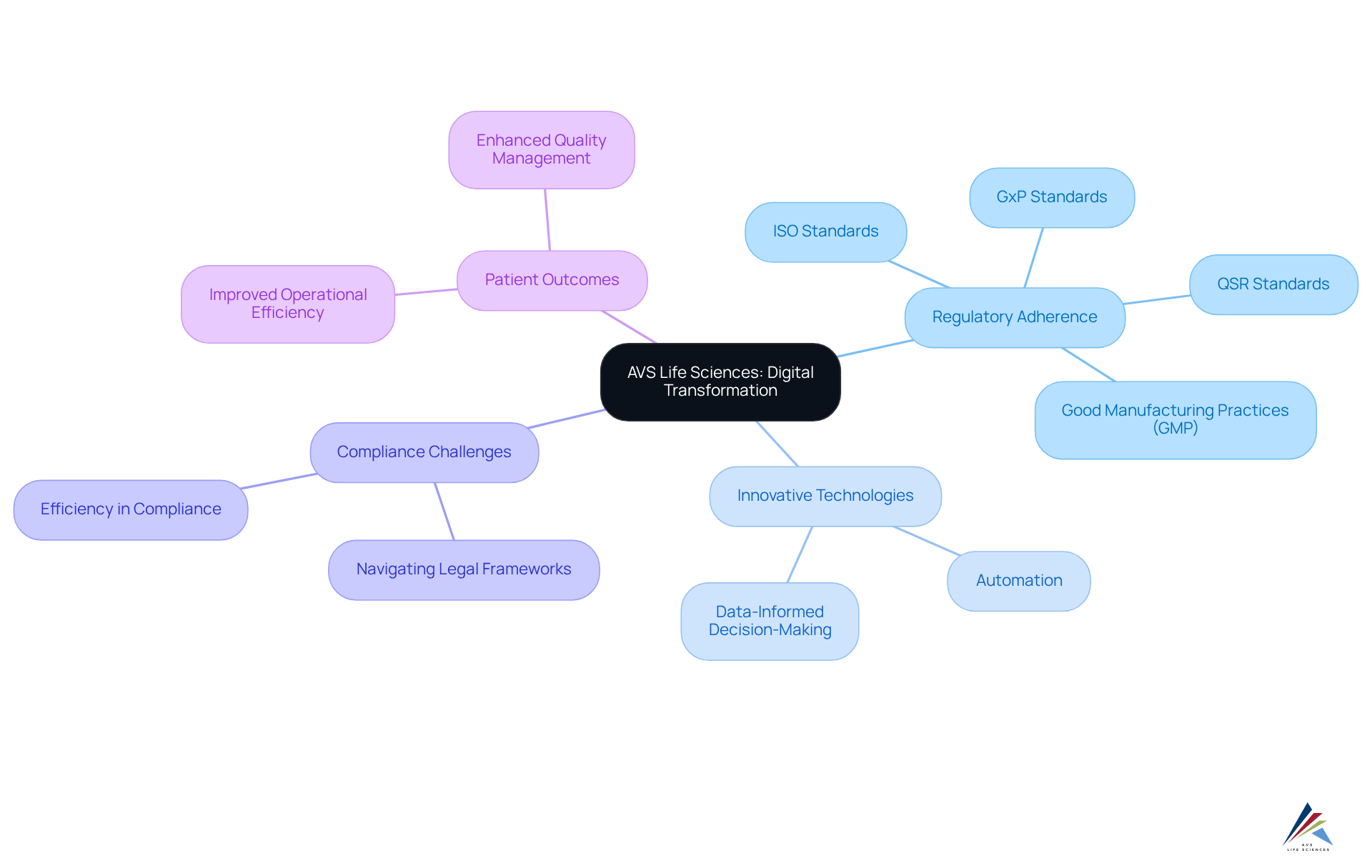
AI and Machine Learning: Enhancing Compliance Processes in Life Sciences
Artificial Intelligence (AI) and machine learning are contributing to the digital transformation in life sciences regulatory processes. These advanced technologies enable organizations to swiftly analyze vast amounts of data, identifying potential regulatory issues before they escalate. By automating routine adherence assessments and leveraging predictive analytics, companies can enhance their risk strategies. This ensures while liberating valuable resources for more strategic initiatives. As the landscape of compliance evolves, embracing these innovations becomes essential for maintaining an edge in regulatory adherence.
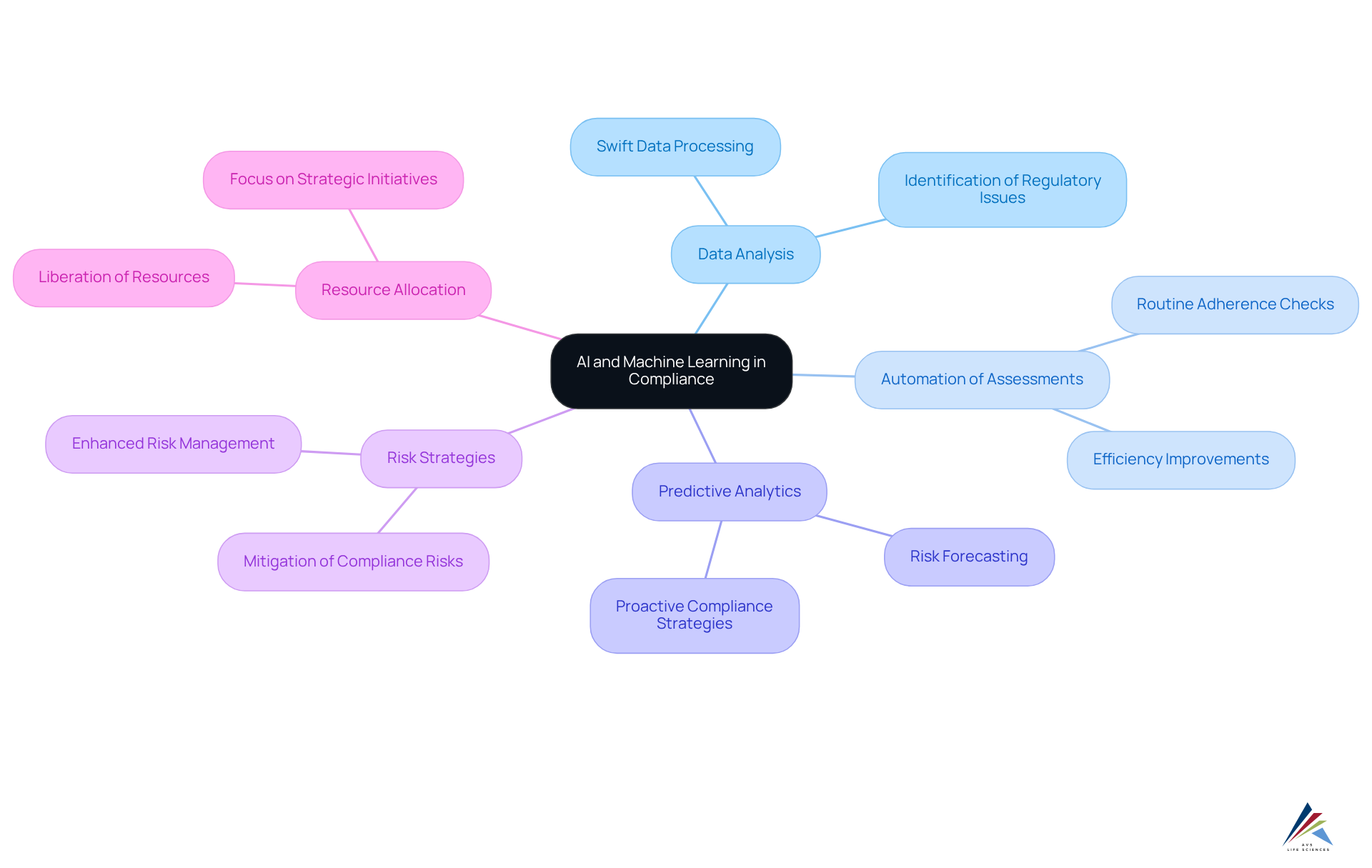
Cloud-Based Solutions: Streamlining Quality Management for Regulatory Compliance
In the life sciences sector, the digital transformation in life sciences is making compliance challenges increasingly complex, necessitating innovative solutions. Cloud-based solutions are progressively being utilized to enhance process oversight, providing organizations with the tools they need to navigate these challenges effectively.
AVS Life Sciences delivers comprehensive assurance solutions and compliance strategies that leverage cloud technology for centralized data storage and immediate access to compliance documentation. This approach not only facilitates collaboration among teams but also ensures adherence to , including GXP and FDA regulations.
By utilizing these advanced cloud-based platforms, organizations can maintain current management systems, thereby facilitating smoother audits and inspections while enhancing data integrity and documentation practices. Engaging with AVS Life Sciences empowers organizations to streamline their compliance processes and fortify their operational frameworks, which is essential for digital transformation in life sciences.
Data Analytics: Monitoring Compliance and Quality Metrics Effectively
Data analytics is pivotal in tracking adherence and performance indicators within the life sciences sector. By leveraging advanced analytics tools, organizations can effectively monitor key performance indicators (KPIs) related to regulatory standards, allowing them to pinpoint trends and areas for improvement. This proactive strategy not only enhances adherence but also fosters a culture of continuous improvement, ensuring that standards are consistently met.
AVS Life Sciences underscores the importance of robust management practices, including:
- Compliance with GXP and FDA regulations
- Development of comprehensive Standard Operating Procedures (SOPs)
- Addressing data integrity deviations
- Conducting thorough investigations
- Implementing Corrective and Preventive Actions (CAPA)
These practices are crucial for maintaining these standards. Our recent case study illustrates a successful enhancement of a biotechnology GMP facility, where our meticulous documentation and assurance efforts guaranteed complete traceability and adherence. By integrating data analytics into these processes, organizations can further strengthen their control measures and ensure alignment with regulatory expectations. Ultimately, utilizing data analytics not only supports adherence but also drives in performance practices.
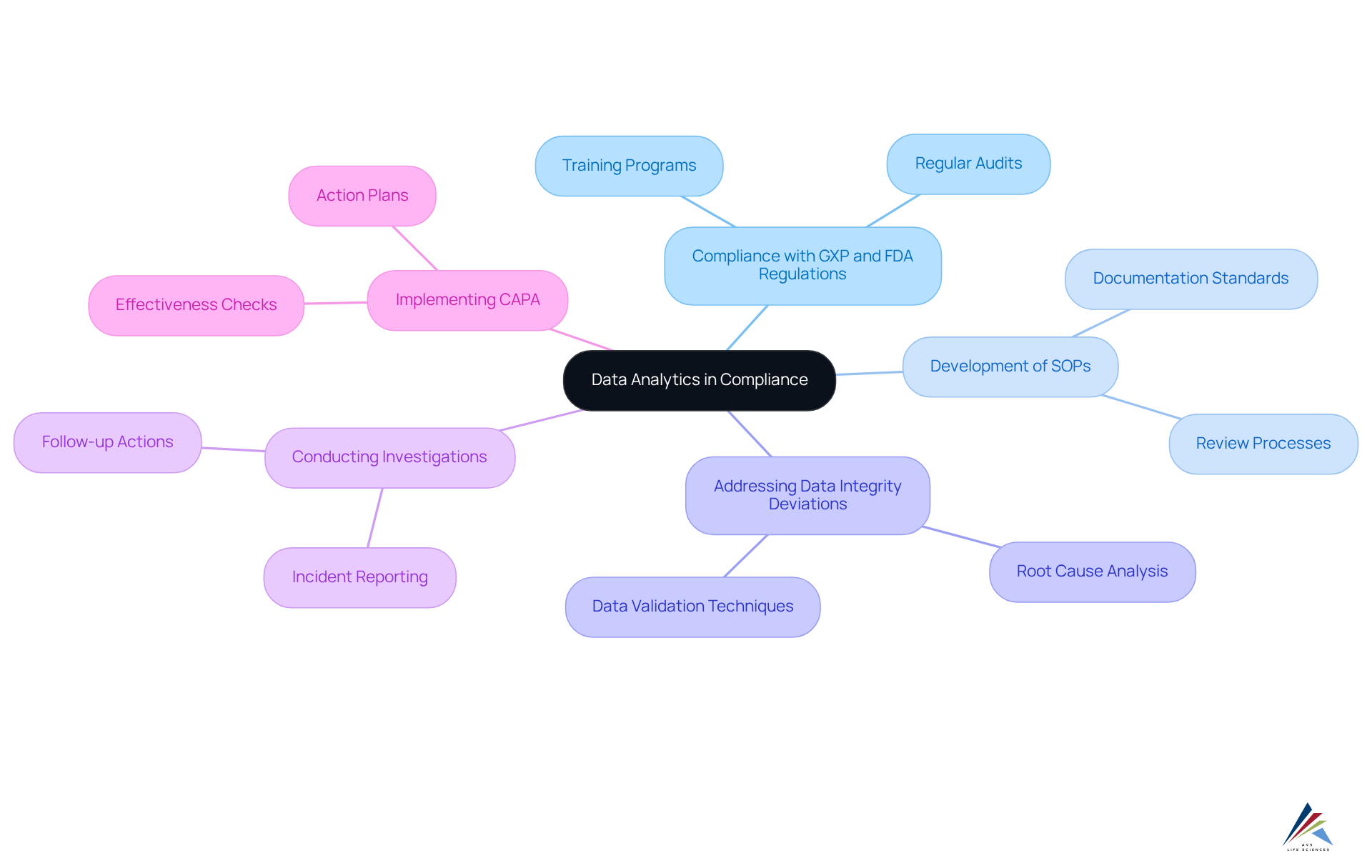
Digital Patient Monitoring: Revolutionizing Compliance and Quality Management
The digital transformation in life sciences is revolutionizing adherence and standard management through digital patient monitoring technologies. These advanced tools facilitate real-time tracking of patient data, empowering organizations to ensure accurate treatment administration and vigilant monitoring for adverse effects.
By implementing digital transformation in life sciences through the integration of digital monitoring into their regulatory frameworks, companies can significantly enhance patient safety and ensure compliance with established guidelines, ultimately elevating the overall standard of care.
Adherence to GXP standards and FDA regulations is paramount in this context, as it guarantees that all processes are meticulously documented and compliant with recognized protocols.
AVS Life Sciences exemplifies this commitment through its successful enhancement of a biotechnology GMP facility, where rigorous assurance practices—including comprehensive documentation and robust internal auditing methods—were implemented.
This case study underscores the critical importance of effective oversight and the role of standard operating procedures (SOPs) in maintaining data integrity and compliance.
Organizations must prioritize the integration of by using digital monitoring tools and SOPs to adeptly navigate the complexities of clinical oversight and bolster their improvement practices.
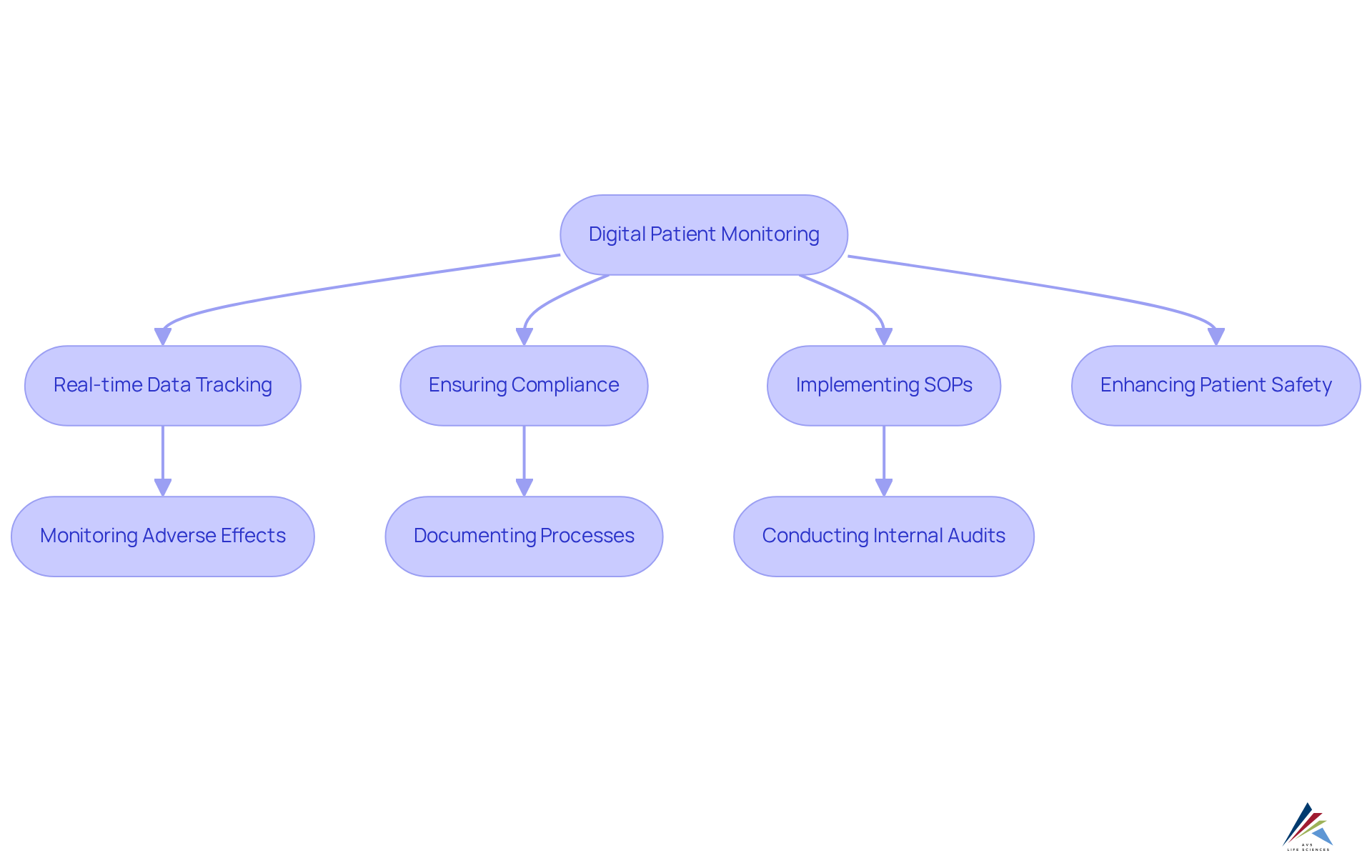
Electronic Health Records (EHR): Improving Compliance and Quality Management
Electronic Health Records (EHR) systems are indispensable for enhancing adherence and oversight excellence in the life sciences sector. By establishing a centralized repository for patient information, EHRs not only facilitate accurate record-keeping but also streamline the documentation process. This dual function significantly boosts adherence to , including GXP and FDA regulations, while simultaneously elevating the standard of care by guaranteeing that healthcare providers have access to comprehensive and up-to-date patient information. Furthermore, the implementation of robust Standard Operating Procedures (SOPs) and strict adherence to data integrity practices within EHR systems are crucial for maintaining elevated quality management standards in the pharmaceutical industry.
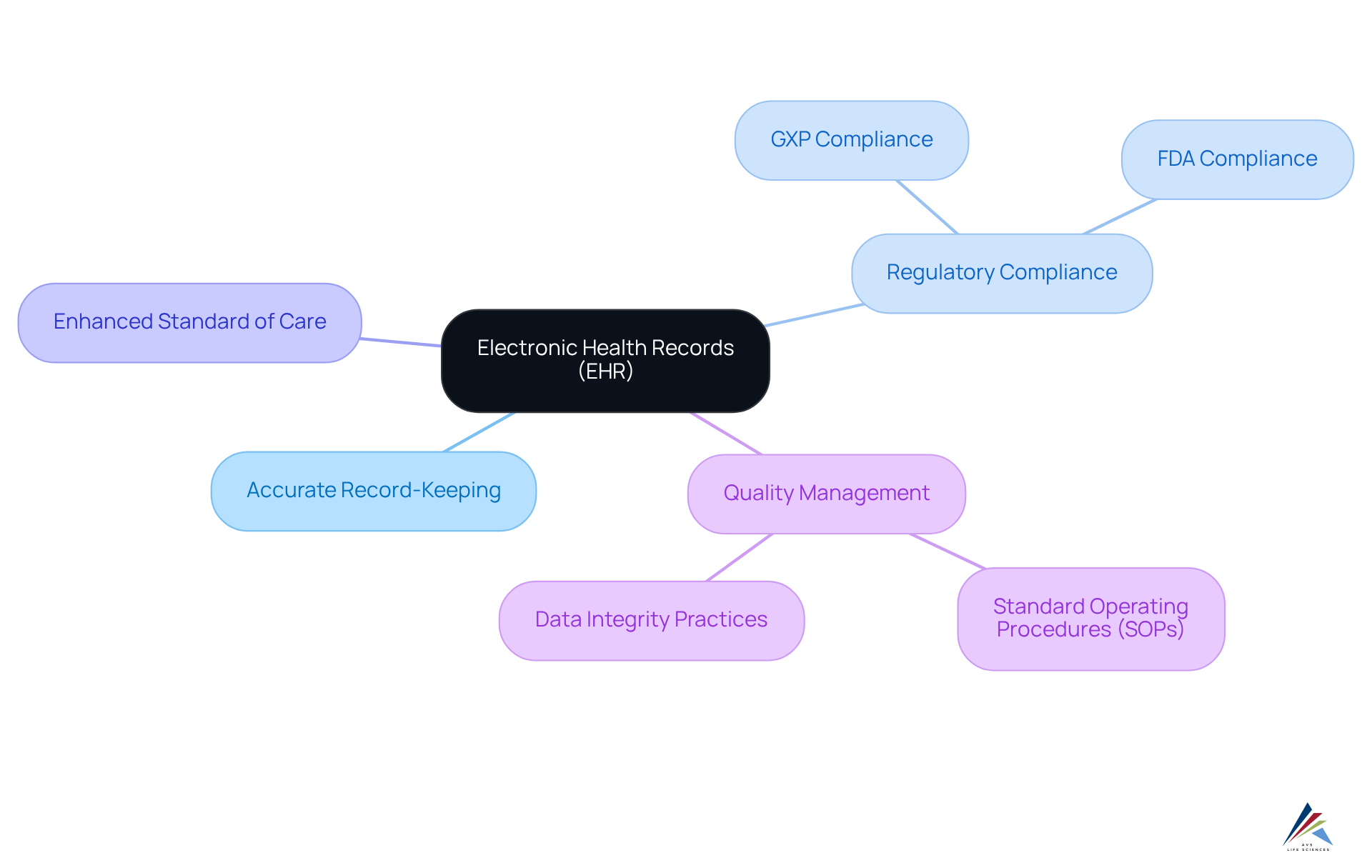
Regulatory Technology (RegTech): Automating Compliance Processes in Life Sciences
Regulatory Technology (RegTech) stands out as a transformative tool for automating adherence processes, playing a crucial role in the digital transformation in the life sciences sector. By leveraging advanced technologies such as artificial intelligence and machine learning, RegTech solutions:
- Streamline regulatory reporting
- Monitor compliance in real-time
- Significantly reduce the risk of human error
This automation not only enhances operational efficiency but also empowers organizations to focus on strategic initiatives, freeing them from the burdens of manual regulatory tasks. The integration of RegTech is not merely an upgrade; it represents a fundamental shift towards more within the context of digital transformation in life sciences. As organizations navigate the complexities of regulatory landscapes, embracing these innovative solutions becomes essential for maintaining competitiveness and ensuring compliance integrity.
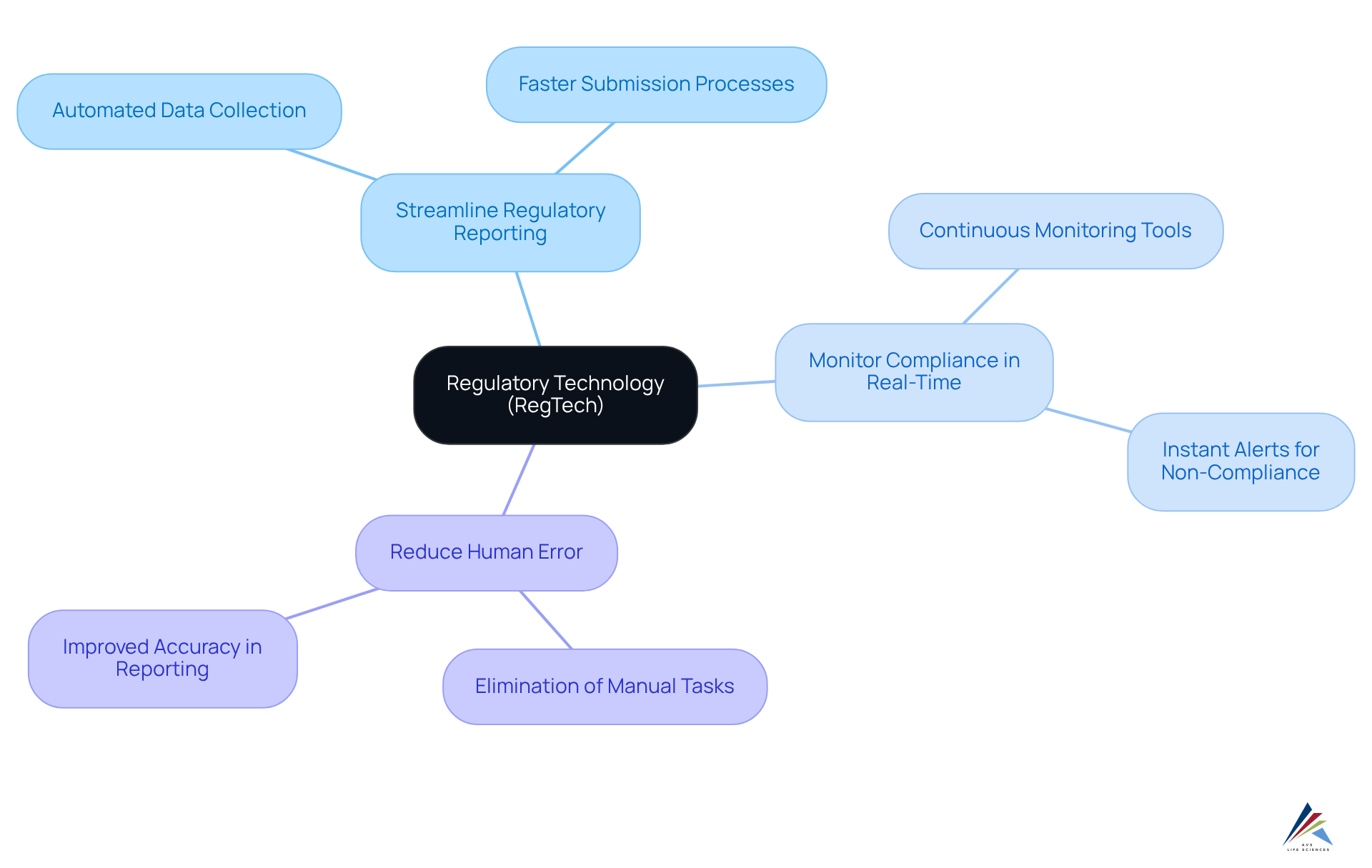
Training and Development: Empowering Staff for Compliance and Quality Management
Training and development are vital components in fostering a culture of adherence and excellence within organizations in the life sciences sector, encompassing biopharmaceuticals, medical devices, and nutraceuticals. By investing in comprehensive training programs, companies can guarantee that their staff are well-prepared to comprehend and comply with regulatory requirements.
AVS Life Sciences empowers organizations by providing specialized consulting and tailored resources that enhance adherence and facilitate process oversight. This approach not only encourages employees to take ownership of standards but also leads to improved outcomes and reduced risk.
With the support of AVS Life Sciences, organizations can cultivate an informed and proactive workforce dedicated to maintaining and compliance with regulations.
Digital Documentation: Maintaining Audit Trails for Compliance and Quality
The digital transformation in life sciences plays a pivotal role in preserving audit trails that demonstrate adherence and quality management. By leveraging electronic systems for documentation, organizations can guarantee that all records remain accurate, accessible, and easily retrievable during audits. This approach not only streamlines the audit process but also enhances transparency and accountability, which are vital for fulfilling regulatory requirements in the realm of digital transformation in life sciences.
Furthermore, robust computer system validation (CSV) practices, as outlined by the FDA, ensure that these electronic systems operate as intended, thereby safeguarding data integrity and compliance with GXP standards. By implementing a structured CSV process that encompasses stages such as:
- Installation Qualification (IQ)
- Operational Qualification (OQ)
- Performance Qualification (PQ)
organizations can effectively validate their systems. This diligence ensures adherence to all regulatory requirements and upholds throughout their operations.
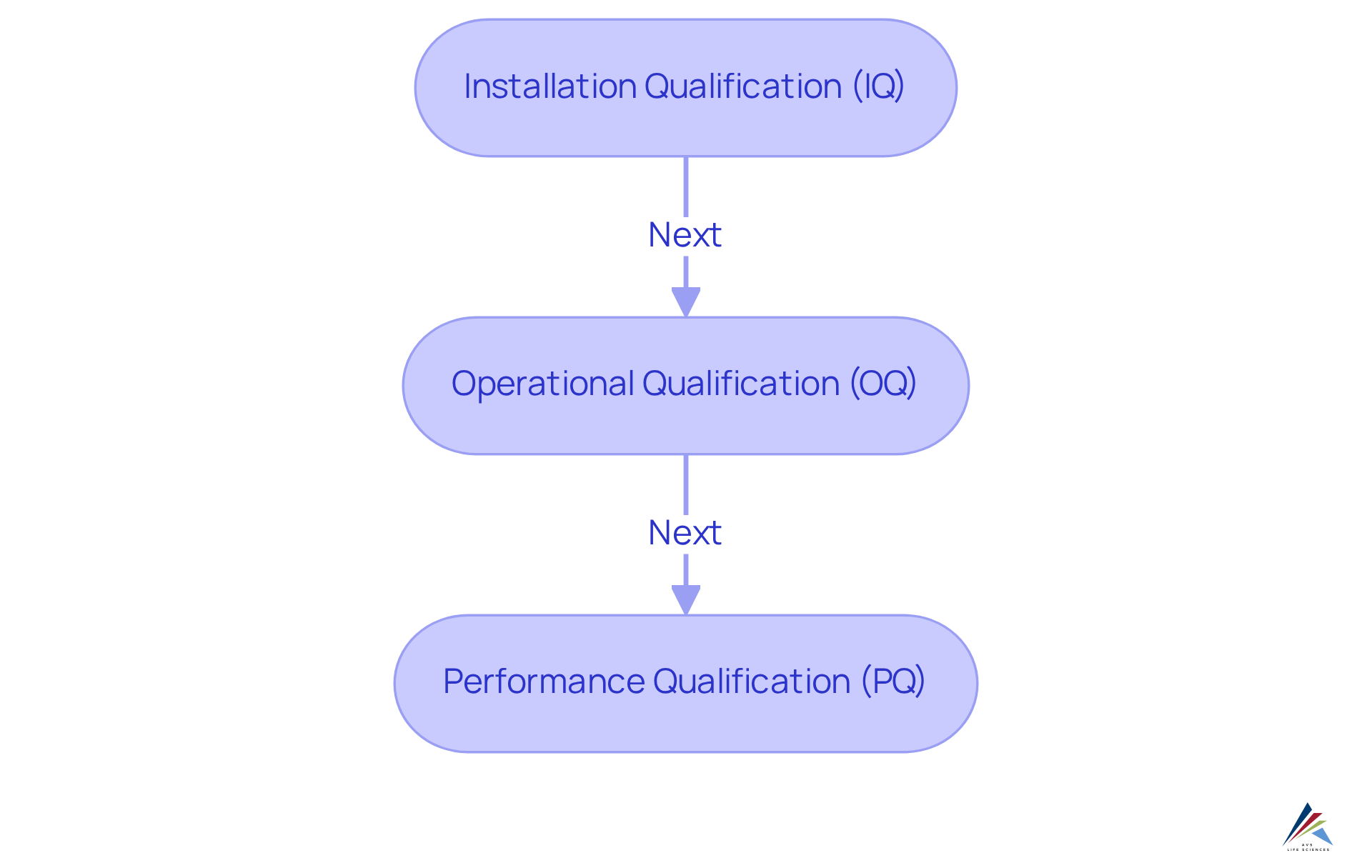
Integrating Legacy Systems: Overcoming Challenges in Digital Transformation
Integrating legacy systems into modern digital frameworks poses significant challenges for organizations within the life sciences industry. These systems often lack compatibility with emerging technologies, resulting in difficulties in achieving seamless data flow and regulatory adherence. However, by adopting a phased approach to integration—one that encompasses thorough gap analysis and the implementation of middleware solutions—organizations can effectively navigate these challenges and ensure the success of their digital transformation in life sciences initiatives.
A transformative case study involving a leading biotechnology company exemplifies this approach:
- AVS Life Sciences successfully upgraded their manufacturing space from a Biosafety Level 1 GMP facility to a Level 2 GMP facility, completing the project on schedule and within budget.
- This integration not only upheld rigorous standards but also enhanced , allowing the client to focus on developing medicines that improve patient well-being.
Such experiences highlight the essential role of comprehensive quality management and regulatory compliance solutions in addressing the complexities of digital transformation in life sciences.
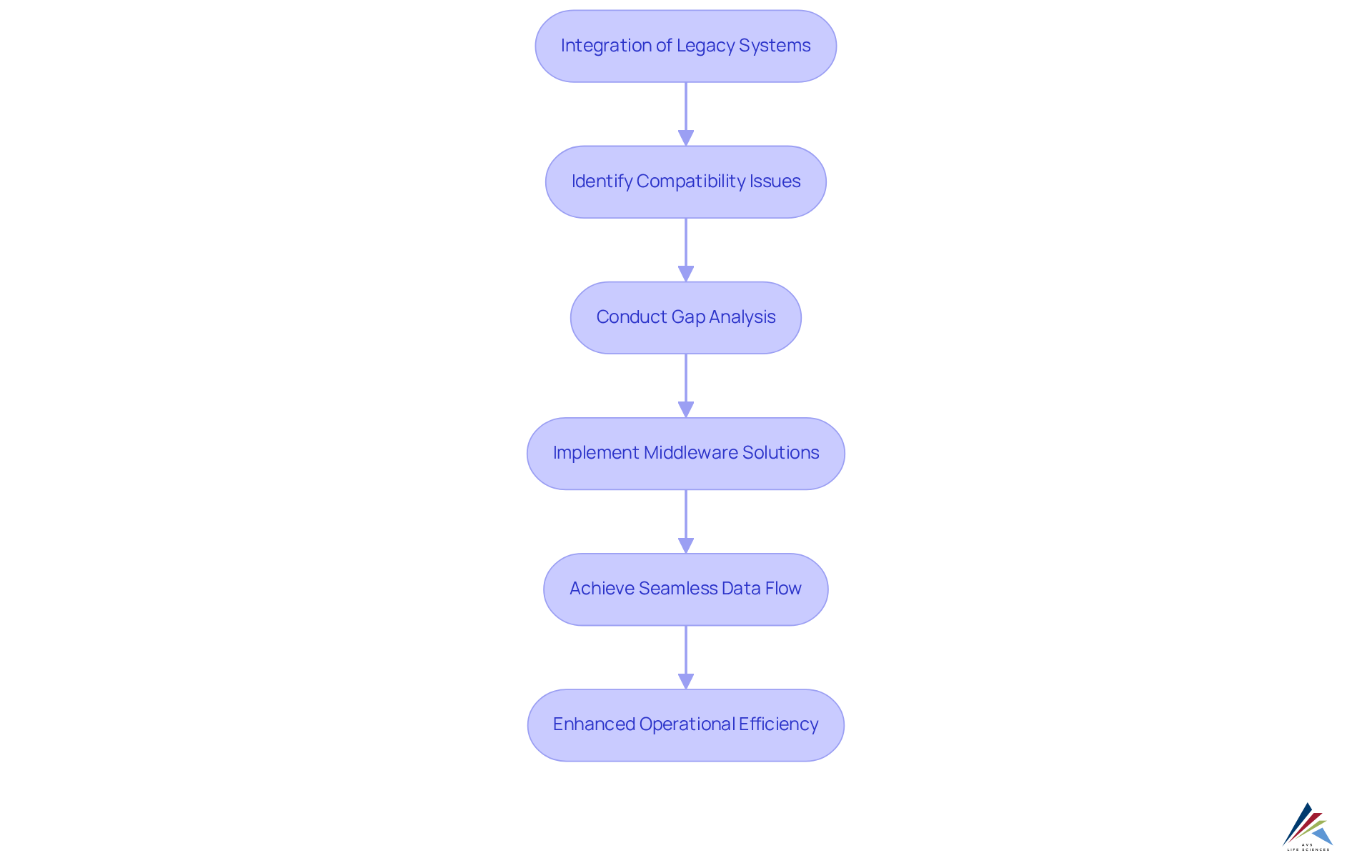
Conclusion
The landscape of life sciences is experiencing a significant transformation, propelled by innovative technologies that enhance compliance and quality management. By embracing digital solutions, organizations can adeptly navigate the complexities of regulatory frameworks, ensuring adherence to essential standards while simultaneously improving patient outcomes. This commitment to digital transformation streamlines operations and positions companies to thrive in an increasingly competitive environment.
Throughout this article, we have highlighted various key innovations, including:
- The use of AI and machine learning for predictive analytics
- Cloud-based solutions for centralized data management
- Digital patient monitoring technologies that ensure compliance and elevate care standards
Furthermore, the importance of robust training programs and digital documentation practices has been underscored, all contributing to a culture of continuous improvement and operational excellence within the life sciences sector.
As the industry advances, leveraging these advancements will be crucial for organizations aiming to maintain compliance and enhance quality management. Engaging with experts like AVS Life Sciences can provide the necessary support to navigate this digital landscape, ensuring that organizations not only meet regulatory requirements but also set new benchmarks for excellence. Embracing these innovations today paves the way for a more efficient, compliant, and patient-centered future in life sciences.
Frequently Asked Questions
What is AVS Life Sciences focused on in terms of digital transformation?
AVS Life Sciences is focused on enhancing regulatory adherence and quality management in life sciences by leveraging innovative technologies across biopharmaceuticals, medical devices, and nutraceuticals.
What compliance challenges does AVS Life Sciences address?
AVS Life Sciences addresses significant compliance challenges related to navigating complex legal frameworks, particularly in GxP, ISO, and QSR standards.
How does AVS Life Sciences improve compliance and quality management?
AVS Life Sciences improves compliance and quality management by implementing advanced digital solutions that enhance automation and data-informed decision-making, facilitating superior oversight and adherence to Good Manufacturing Practices (GMP).
What role do AI and machine learning play in regulatory processes in life sciences?
AI and machine learning enhance compliance processes by enabling organizations to analyze large data sets quickly, identify potential regulatory issues, automate routine assessments, and leverage predictive analytics to improve risk strategies.
How do cloud-based solutions contribute to regulatory compliance in life sciences?
Cloud-based solutions streamline quality management by providing centralized data storage and immediate access to compliance documentation, which enhances process oversight and facilitates collaboration among teams.
What benefits do organizations gain from engaging with AVS Life Sciences?
Organizations gain comprehensive assurance solutions, improved operational efficiency, enhanced data integrity, and better preparation for audits and inspections by engaging with AVS Life Sciences.
